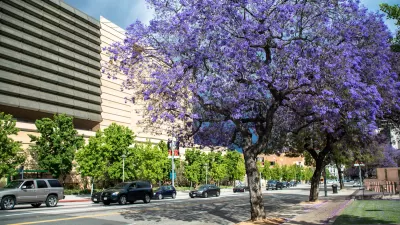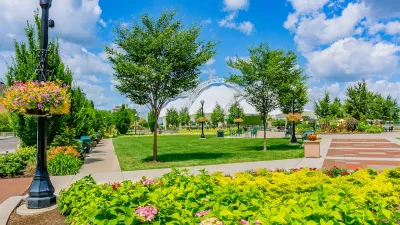Los Angeles County’s Community Forest Management Plan seeks to create a healthier, more equitable community forest by expanding tree coverage, engaging communities, and building resilience to climate impacts.

In an increasingly urbanized world, the role of nature within our communities has never been more important. The need to integrate trees and green spaces is essential not only for environmental sustainability but also for the health and well-being of residents. Community forestry, the practice of involving local communities in the management and care of community forests, stands as a key strategy to address these needs. By fostering a close relationship between people and their natural surroundings, community forestry ensures that the many benefits of trees are recognized, valued, and preserved for future generations.
The Los Angeles County Community Forest Management Plan (CFMP) was developed to address gaps in tree coverage and expand the benefits of trees to underserved communities. Through collaboration with key departments like Parks and Recreation, Public Health, and Public Works, as well as community-based organizations and residents, the CFMP aims to increase tree canopy coverage, focusing on areas that lack parks and green spaces. The Plan also addresses emerging threats, such as climate change and invasive pests, by implementing science-based practices and prioritizing community engagement to ensure a sustainable, inclusive approach to tree management and expansion.
The CFMP seeks to create a more equitable community forest through initiatives like increasing tree canopy in vulnerable areas, enhancing tree health and longevity, fostering community engagement, and preparing the community forest to adapt to climate challenges. By involving residents in all aspects of community forestry, L.A. County is building a foundation for long-term support and resilience. This forward-thinking plan not only benefits current residents but also paves the way for a healthier and greener future, particularly in communities historically impacted by environmental injustices.
FULL STORY: Trees for All

Maui's Vacation Rental Debate Turns Ugly
Verbal attacks, misinformation campaigns and fistfights plague a high-stakes debate to convert thousands of vacation rentals into long-term housing.

Planetizen Federal Action Tracker
A weekly monitor of how Trump’s orders and actions are impacting planners and planning in America.

San Francisco Suspends Traffic Calming Amidst Record Deaths
Citing “a challenging fiscal landscape,” the city will cease the program on the heels of 42 traffic deaths, including 24 pedestrians.

Defunct Pittsburgh Power Plant to Become Residential Tower
A decommissioned steam heat plant will be redeveloped into almost 100 affordable housing units.

Trump Prompts Restructuring of Transportation Research Board in “Unprecedented Overreach”
The TRB has eliminated more than half of its committees including those focused on climate, equity, and cities.

Amtrak Rolls Out New Orleans to Alabama “Mardi Gras” Train
The new service will operate morning and evening departures between Mobile and New Orleans.
Urban Design for Planners 1: Software Tools
This six-course series explores essential urban design concepts using open source software and equips planners with the tools they need to participate fully in the urban design process.
Planning for Universal Design
Learn the tools for implementing Universal Design in planning regulations.
Heyer Gruel & Associates PA
JM Goldson LLC
Custer County Colorado
City of Camden Redevelopment Agency
City of Astoria
Transportation Research & Education Center (TREC) at Portland State University
Jefferson Parish Government
Camden Redevelopment Agency
City of Claremont





























